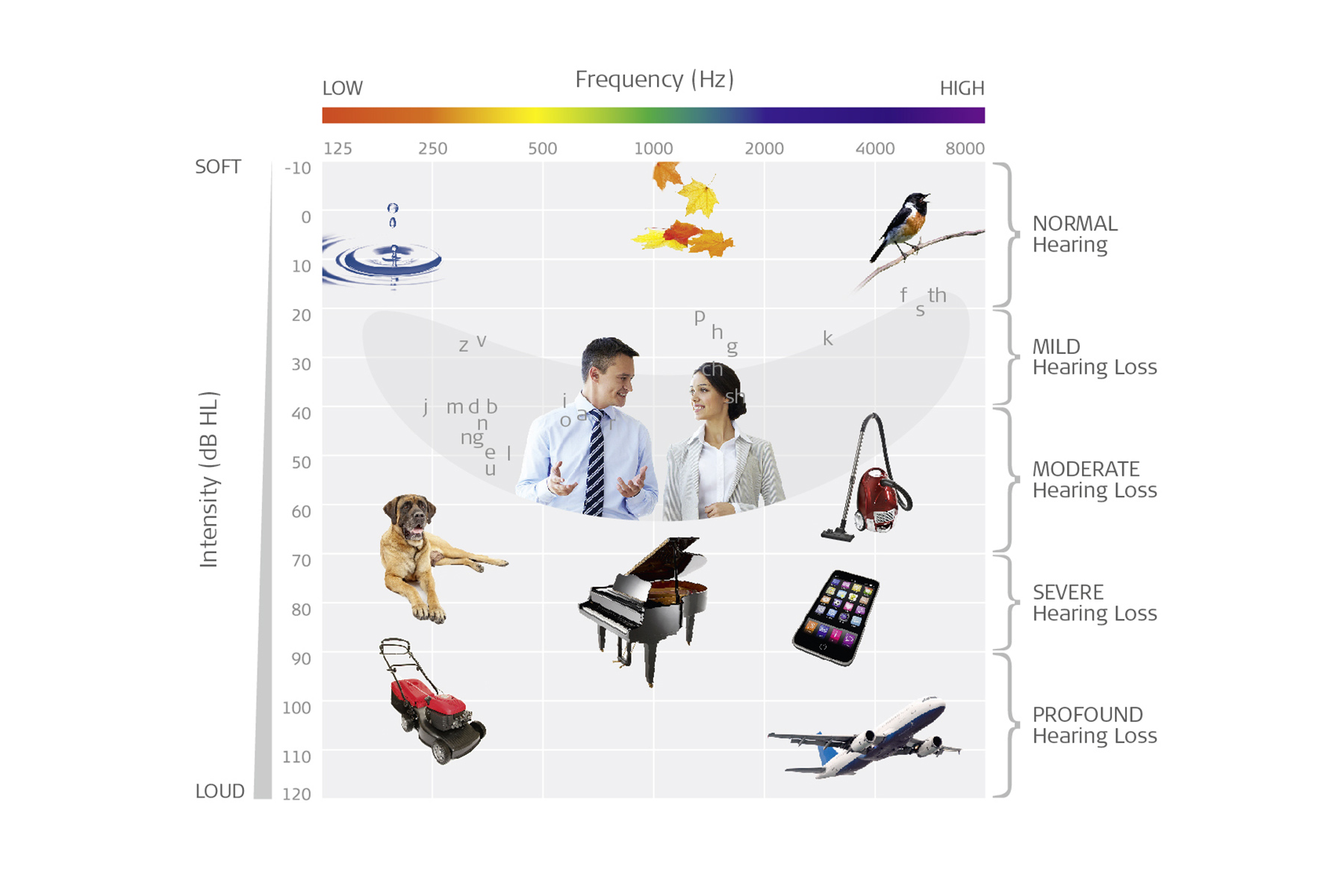MED-EL
Published Dec 23, 2014 | Last Update Mar 15, 2023
What Is A Degree Of Hearing Loss?

We’ve talked before about the different types and causes of hearing loss, but there are other factors that determine someone’s specific hearing loss. One of these factors is the degree of hearing loss.
The degree of hearing loss is measured by testing the softest sounds that an individual can hear at different pitches. By looking at both the type and degree of someone’s hearing loss, an audiologist or medical professional can get a pretty good idea of the best solution for them.
If you’ve just started learning about a hearing loss you might want to read our blog post about what the intensity and pitch of sound are, because we’ll be referring to these throughout this post.
The Degree of Hearing Loss
At MED-EL, when we talk about the degree of hearing loss, there are five different levels that we use. These are, from the least to the most significant: Minimal, Mild, Moderate, Severe, and Profound.
It’s important to note that someone may have a different degree of hearing loss at different pitches. For example someone might have a mild hearing loss in the low frequencies but a profound hearing loss in the high frequencies, which means that they could hear a dog barking but not the ringing of a doorbell.
The examples below refer to the degree of hearing loss only at a specific frequency. For more information about what it’s like to have different types of hearing loss, check out our Hearing Loss Stories.
Minimal Hearing Loss
Minimal hearing loss means that a person can hear sounds that are around 0 to 20 decibels (dB). That means that they can hear pretty much every sound including the softest ones, like falling leaves or birds chirping, without any sort of assistance.
Mild Hearing Loss
Mild hearing loss is the next degree of hearing loss. Someone with mild hearing loss cannot hear many sounds softer than 20–40 dB. This means that they can hear person’s inside voice, which is about 65dB, but not softer sounds like a ticking clock, dripping faucet, or many of the softer sounds of speech.
Someone with mild hearing loss may want to seek out hearing aids, which amplify these quiet sounds with a speaker to make them easier to hear.
Moderate Hearing Loss
A moderate degree of hearing loss, if untreated, can affect a person’s daily life in a significant way. Someone with moderate hearing loss cannot hear sounds softer than 40–70 dB. This means that they may be unable to hear sounds like normal conversation or the ringing of a telephone.
Depending on the person’s health, solutions to moderate hearing loss could include more powerful hearing aids, middle ear implants, or bone conduction implants.
Severe Hearing Loss
Severe hearing loss will almost always affect a person’s daily life. Someone with severe hearing loss cannot hear sounds softer than 70–90 dB. This means that they may be unable to hear sounds like loud conversation or traffic noise.
Someone with severe hearing loss may seek stronger and stronger hearing aids, but sometimes even the most powerful hearing aids won’t be enough. If they don’t work, middle ear implants or cochlear implants are another option that they may not have heard about before.
Profound Hearing Loss
Profound hearing loss is the most significant degree of hearing loss. Someone with profound hearing loss cannot hear sounds softer than 90–120 dB. This means that they may be unable to hear very loud sounds like airplane engines, trucks moving down the road, or fire alarms.
For someone with profound hearing loss, hearing aids will likely be ineffective and a cochlear implant may be the best solution.
Determining the Degree of Hearing Loss
How does someone know what degree of hearing loss they have at different frequencies of sound? The best way to find out is to get your hearing checked by a trained audiologist or medical professional. The results of this hearing test will be shown on an audiogram like this one:
In this example audiogram, you can see that the person has a mild hearing loss in the low frequencies that becomes a profound hearing loss in the high frequencies. Typically a person with this hearing loss will be able to hear dogs barking, but not the ringing of a doorbell.
Get Your Hearing Tested
If it’s been a while since you’ve had your hearing checked, why not use our quick online hearing test? Or if you already know your specific degree of hearing loss but are not satisfied with your current hearing loss solution, you can always contact your local MED-EL representative to learn about other solutions that may be available to you.
Has this information helped you understand the degrees of hearing loss? Do you have any questions?
Have you heard about SONNET 2? Discover how our latest cochlear implant audio processor is made for you.
Only a medical professional can diagnose a hearing loss. This information is meant as a guide, and should not be used to replace professional medical advice.
MED-EL
Was this article helpful?
Thanks for your feedback.
Sign up for newsletter below for more.
Thanks for your feedback.
Please leave your message below.
Thanks for your message. We will reply as soon as possible.
Send us a message
Field is required
John Doe
Field is required
name@mail.com
Field is required
What do you think?
MED-EL


